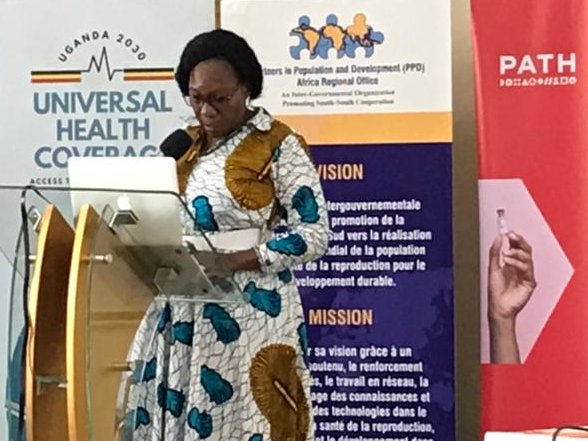The Commissioner for Planning, Finance and Policy of the Ministry of Health, Dr Sarah Byakika, on Thursday, May 5, 2022, updated the press and other non-state actors on the progress of the National Health Insurance Scheme (NHIS) Bill development process.
The meeting was organized by PATH, a global team of innovators working to increase health equity so people, communities and economies can thrive with Marie Stopes Uganda, the leading provider of sexual health services and reproduction in Uganda and the Ministry of Health.
This was done in close coordination with other partners in population and development – Regional Office for Africa (PPD ARO), an intergovernmental organization promoting South-South cooperation and RMNCAH+N, a platform of CSOs working to build accountability and influence policy to improve services for women, children and adolescents in Uganda.
“Health insurance coverage is still very low in Uganda. Only 5% of the population has some form of health insurance. Out-of-pocket health expenditure is around 38%,” Byakika said during a media orientation meeting on advocacy for the NHIS Bill held at Protea Hotel, Kololo in Kampala.
According to her, the struggle to have an NHIS in Uganda dates back to 1995.
Dr Byakika said that in 2017 only 2.1% of the Ugandan population was aware of the scheme, 5% were covered by some form of insurance while 45% would consider joining.
“Less than 2% of Ugandans are covered by existing private health insurance schemes. 41% of total health expenditure is borne by patients,” Dr Byakika reiterated what she said about the bill in 2019.
In February 2020, PPD ARO released a briefing note on the proposed program and held a series of media engagement activities to share program details and benefits, including its coverage of family planning, with the audience.
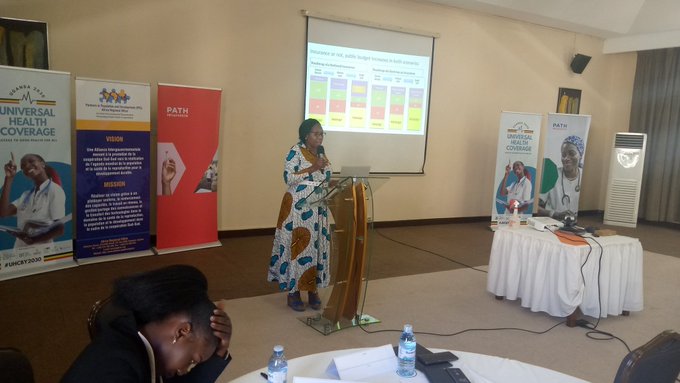
This kept the issue front and center for parliamentarians across the country as the COVID-19 pandemic unfolded, challenging national health financing.
The media helped keep the pressure on parliament to pass the bill, which finally happened on March 31, 2021.
When the bill was passed in parliament, President Museveni did not sign it into law but instead sent it back to the Ministry of Health in October 2021 for resubmission to the cabinet.
According to Dr Byakika, the legal issues of the NHIS 2021 Act as identified by the Solicitor General have been resolved and the concerns of the private sector and employers have also been addressed in the NHIS 2022 Bill which is still in the office of the solicitor general.
The Ministry of Health, in conjunction with the Uganda Insurance Regulatory Authority, is undertaking studies to determine NHIS contributions, an affordable benefit package and medium-term costs.
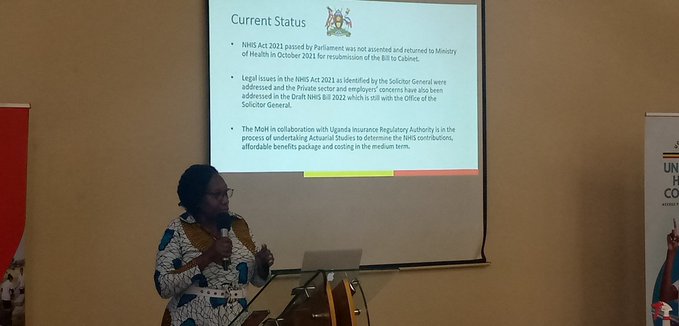
Dr. Byakika highlighted some of the amendments made to the bill including; Compulsory contributions for everyone over 18, including indigenous people and vulnerable groups (these represent around 19-22% of the population).
“There will be no employer contributions for employees, which was seen as an overburden for private sector employers,” she noted.
On the issue of already existing health insurance packages by employers, Dr Byakika said the Solicitor General will advise.
She said contributions will be segmented according to income groups respecting the principles of solidarity and accessibility and that the benefits package will be defined and reviewed from time to time according to accessibility.
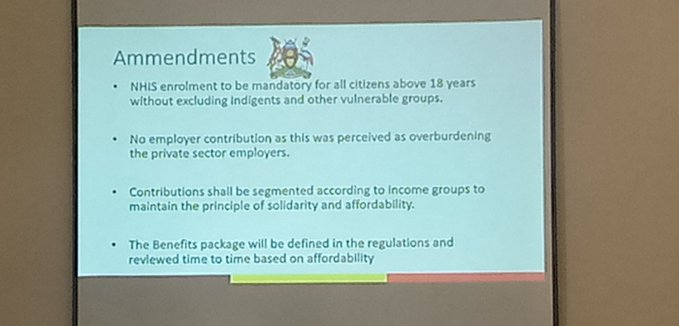
Uganda is the only country in East Africa that has not adopted a national health insurance scheme and has among the highest health expenditures in the region.
According to Dr Charles Olaro, Director of Curative Services at the Ministry of Health, an estimated 41% of Uganda’s health expenditure is paid for by individuals through out-of-pocket payments, followed by development partners (41%) while the government contributes only (17%).
Health insurers contribute only about 1% to health expenditure in Uganda.
Concerns of CSOs and the private sector
The NHIS Bill passed but had issues, which is why the President sent it back for amendments with legal and private sector issues raised.
Civil society organizations are concerned about the focus on equity for the vulnerable and disadvantaged (indigent), contributions for employees by employers, timely implementation of the scheme, transparency and accountability, advocacy awareness (right to health), sustainability and achievement of national plan, regional and global commitments.
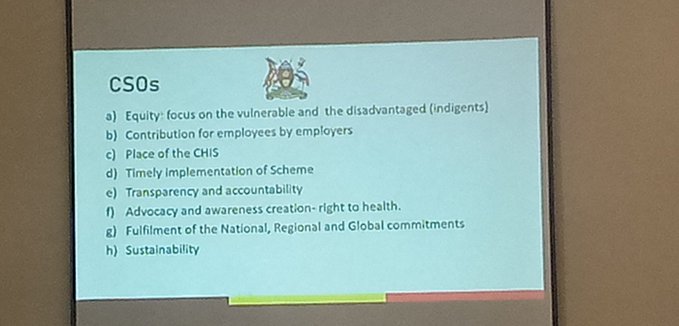
Private employers, on the other hand, have publicly expressed their opposition to the scheme, fearing that paying employee contributions will increase the cost of their operations.
Grace Ssali Kiwanuka, Executive Director of the Uganda Health Care Federation (UHF), explained the private sector perspective on the proposed National Health Insurance Scheme.
She thanked the Ministry of Health for reflecting her concerns in the amended draft.
According to her, the private sector is more profit-oriented and must take into account the heavy taxes levied on private companies.
Kiwanuka insisted that companies must consider workers’ wages as well as other expenses, saying it would be unfair to add mandatory health insurance for staff on top of that.
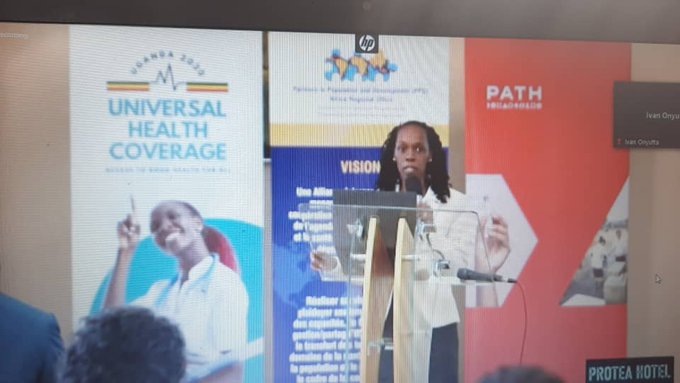
“Ladies and gentlemen, even the chairs you sit on cost money. If we pay you a salary and then add your insurance, how are we going to fix these chairs? she said as an example.
However, participants poked holes in his submissions wondering why private companies would prioritize profit over employee health, when without human capital these companies would not realize those profits.
Kiwanuka was reminded that the government, in most cases, grants tax holidays and exemptions to investors who
The Reverend Nathan Balirwana Mugalu, a counseling psychologist, adolescent mentoring specialist and National Male Champion for Sexual and Reproductive Health and Rights (SRHR) also voiced his support for the bill.
“We need to get this bill done and passed. Health insurance benefits our girls and women in a special way,” tweeted Reverend Mugalu who personally attended the media orientation meeting.
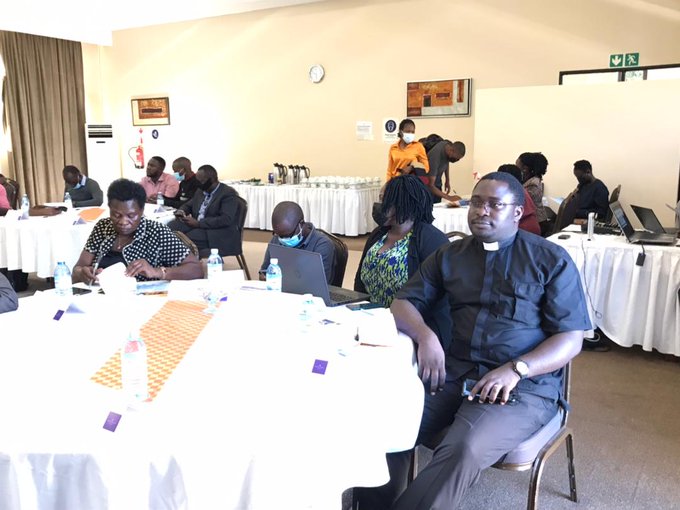
Proponents say once passed into law; the bill will encourage quality services for institutions which, in turn, will innovate to provide quality health care.
A method to minimize unnecessary hospital visits by policyholders is suggested; to have an integrated co-payment system requiring all clients to pay a minimum of 1,000 Ugandan shillings each time a patient visits the hospital.
This sparked the need for more advocacy to ensure the president signs it off in a timely manner.
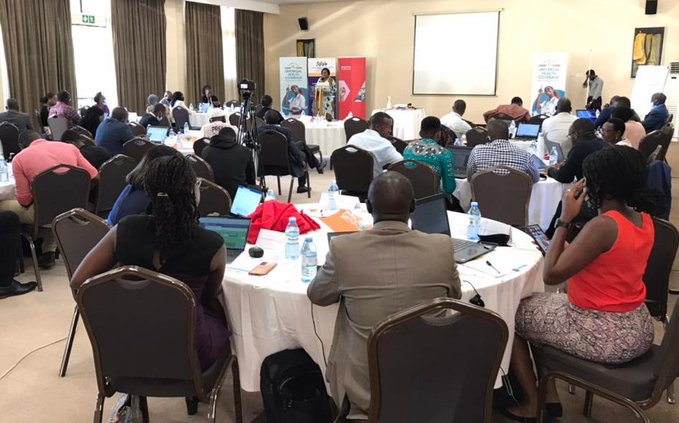
Advocates pledged to continue to engage with the president to highlight the benefits of National Health Insurance; they also plan to keep up the pressure to sign the bill by continuing media coverage and strategic messaging.
When the Bill becomes law, Civil Society Champions intend to remain engaged and support the regulatory process and program implementation.
Post views:
ten

